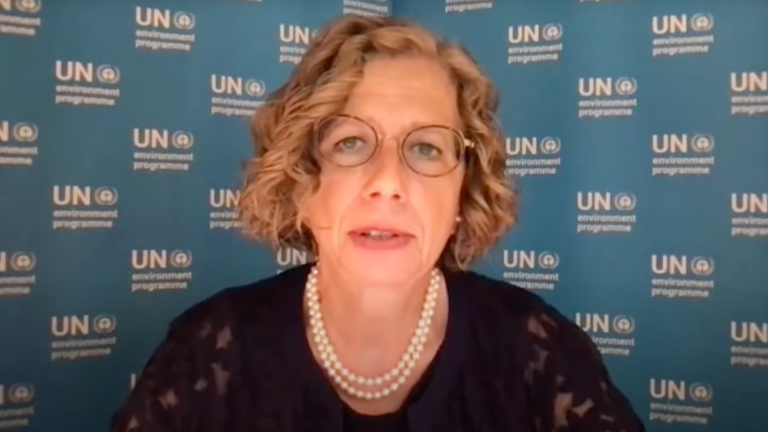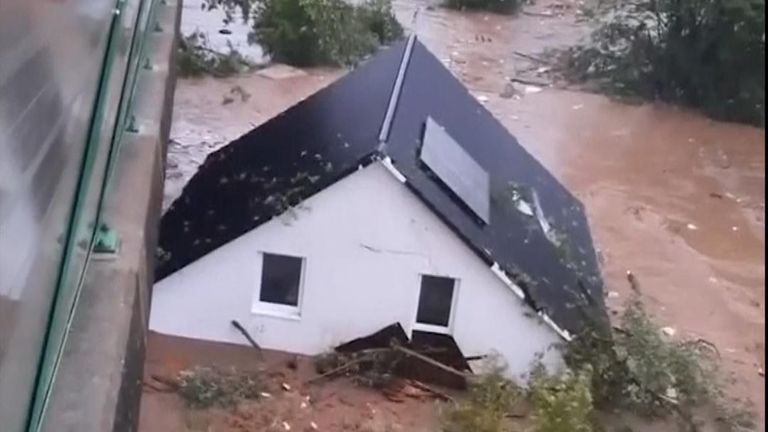A code red for humanity Landmark climate report says global warming limit to be hit within 20 years
Heatwaves, flooding and droughts will be more frequent and more intense as the world is set to hit the 1.5C global warming limit within the next 20 years, a landmark United Nations review has predicted.
The milestone scientific assessment says the rate of warming in the last 2,000 years has been "unprecedented" and it was "unequivocal" that human influence has made the world hotter.
In fact, it is already responsible for 1.1C of global warming since 1850, the report said.
UN secretary-general Antonio Guterres described the findings as a "code red for humanity" and scientists, campaigners and politicians lined up to call for a shift away from polluting fossil fuels and to end deforestation.
Need to act in '2020s' on climate change - VallanceEvery inhabited region on Earth is already impacted by climate change and the report found that the accepted 1.5C limit will be met even in the best case scenario, causing more regular extreme weather events.
Advertisement
Under the 2015 Paris Agreement, more than 190 governments agreed the world should limit global warming to 2C or ideally 1.5C above pre-industrial levels.
The report warns that even in the most optimistic scenarios, some changes are already locked in to our systems, including sea level rise.
More on Cop26This will never be reversed, not even under the lowest emissions scenario, it said.
Climate activist Greta Thunberg, who has confirmed on Monday she will attend the UN climate talks COP26 in Glasgow, said the report "confirms what we already know... that we are in an emergency".
"We can still avoid the worst consequences, but not if we continue like today, and not without treating the crisis like a crisis," she said on Twitter.
Residents flee Greek island engulfed in flamesUnveiling the report, UN environment programme chief Inger Ansersen said: "Nobody's safe and it's getting worse faster. We must treat climate change as an immediate threat."
The language in the review is bolder than the last equivalent report from the Intergovernmental Panel on Climate Change (IPCC), the UN's climate science body, which in 2013 called human influence on the climate system "clear".
UN: Climate change poses 'immediate threat'As in previous years, the report will likely set the scene for this year's annual UN climate change negotiations, COP26.
The government's climate chief Alok Sharma, who is leading COP26, called the report a "wake-up call for the world" that showed "the deficiency of our response to date".
He said: "This report shows that 1.5 degrees is still achievable but that it is retreating.
"We do need to... make sure that at COP26 we are able to credibly say that we have kept 1.5 degrees alive."
The government's chief scientific adviser, Sir Patrick Vallance, sent a message to world leaders due to attend the talks, saying: "People need to act now....waiting for some magical silver bullet of innovation is not going to help.
"It's easy to assume that something can happen later to rectify this.
"The message is: 'No, it has to happen now. The roadmap needs to be implemented now,' and we need to know when we're off course and correct that as soon as possible."
The "good news" in the report, said Dr Joeri Rogelj, climate change lecturer at Imperial College London, was that if the world did achieve net zero by 2050, there was a "significant chance" that we eventually stabilise below 1.5C.
Lead author Dr Tamsin Edwards told Sky News: "That is something people may see as optimistic, but we're not there, and we are on higher emissions pathways at the moment that would lead to much greater climate change."
Unless there are "immediate, rapid and large scale reductions in greenhouse gas emissions", the 1.5C target will be beyond reach, she added.
This is the first time the influential group of scientists could say climate change is already impacting every inhabited region on the planet - thanks to advances in attribution science, which which assesses human influence on weather.
The IPCC investigated five future scenarios based on how much carbon dioxide the world continues to emit and what we do to compensate.
They found that even under the most optimistic pathway, which assumes "very low" emissions and achieving net zero around 2050, the world will hit 1.5 degrees in the next 20 years - though it could level off at 1.4C towards the end of the century.
The authors have stressed that the goal of limiting warming to 1.5C is not a "cliff edge".
"The consequences get worse and worse and worse as we get warmer and warmer," said Ed Hawkins, climate science professor at Reading University. "And so every tonne of CO2 matters and every bit of warming matters."
Many countries including the UK have pledged by 2050 to reach net zero - which means reducing emissions as much as possible and offsetting the rest - but have been criticised for failing to match this rhetoric with action.
House swept along river in Germany floodsGreenpeace UK's chief scientist Dr Doug Parr said this generation of world leaders was the "last that can afford to ignore" the "gravity of the climate crisis".
Dr Parr said the increased "frequency, scale and intensity of climate disasters that have scorched and flooded many parts of the world in recent months is the result of past inaction".
"We need concrete policies to cut carbon emissions as fast as possible, phase out fossil fuels, transform our food system and deliver more cash to the countries worst hit by the climate crisis," he added.
The report cautioned 2C warming would likely breach extreme heat thresholds for agriculture and health.
The assessment found carbon removal could reverse some of the increase in global temperatures - although a lot of this technology is unproven to work at scale, says Friends of the Earth.
Labour leader Sir Keir Starmer said: "The IPCC report is the starkest reminder yet that the climate crisis is here right now and is the biggest long-term threat we face. The biggest threat we now face is not climate denial but climate delay."
Subscribe to ClimateCast on Spotify, Apple Podcasts, or Spreaker.
Sky News has launched the first daily prime time news show dedicated to climate change.
The Daily Climate Show is broadcast at 6.30pm and 9.30pm Monday to Friday on Sky News, the Sky News website and app, on YouTube and Twitter.
Hosted by Anna Jones, it follows Sky News correspondents as they investigate how global warming is changing our landscape and how we all live our lives.
The show also highlights solutions to the crisis and how small changes can make a big difference.
 Need to act in '2020s' on climate change - Vallance
Need to act in '2020s' on climate change - Vallance  Residents flee Greek island engulfed in flames
Residents flee Greek island engulfed in flames  UN: Climate change poses 'immediate threat'
UN: Climate change poses 'immediate threat'  House swept along river in Germany floods
House swept along river in Germany floods 
0 Response to "A code red for humanity Landmark climate report says global warming limit to be hit within 20 years"
Post a Comment